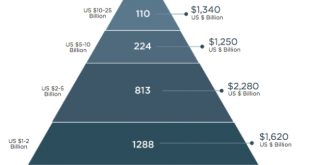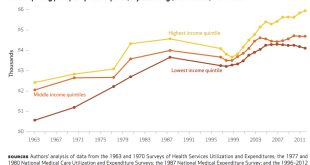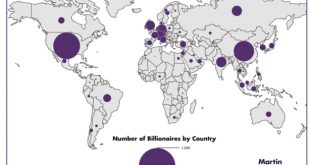from David Ruccio Is education the solution to the problem of growing inequality? As I wrote in early 2015, Americans like to think that education is the solution to all economic and social problems. Including, of course, growing inequality. Why? Because focusing on education—encouraging people to get more higher education—involves no particular tradeoffs. More education for some doesn’t mean less education for others (at least in principle). And providing more education doesn’t involve...
Read More »Financialization of corporate behaviour
from Maria Alejandra Madi The global scenario has restated the menace of deep depressions among the economic challenges. Indeed, in the current setting, the principles of corporate behaviour have reinforced the lack of commitment to long-run social and economic sustainability. Looking backward, in the context of the 1930 Great Depression, John Maynard Keynes pointed out that the evolution of capital markets increases the risk of speculation and instability since these markets are mostly...
Read More »The Paradox of People
from Peter Radford Last week I stirred up a certain curiosity as to why I had lumped Peter Drucker into the same bag as both von Mises and Hayek. Well, simply put, the three of them, along with Karl Popper and Joesph Schumpeter, had an enormous, even oversized, impact on modern economics. Yes economics. Let’s not fall into the same trap as economists do when they, with a sweep of their hands, dismiss business theory as not an aspect of economics. Of course it is. After all if business is...
Read More »“Wealth helps accumulate more wealth”
from David Ruccio The world economy only grew by 3.1 percent in 2015. But the world’s billionaires did much better. As David Barks, associate director of custom research for Wealth-X, understands, “Wealth helps accumulate more wealth.” According to the latest Wealth-X report on the global billionaire population, the world’s billionaire population grew by 6.4 percent, to 2,473, last year. And their combined wealth increased by 5.4 percent, to a record $7.7 trillion. Needless to say, the...
Read More »Trump, denial and the end of normal
from Peter Radford Shocking is an understatement. Donald Trump is unfit for public office, be it town clerk or president of the US. He’s an unbalanced egomaniac. He’s a racist. He’s an immature misogynist. He’s many other awful things. Presidential, he is not. How did we get here? Failure. But a particular kind of failure. Failure dressed as success. A success so sweeping and deep that we hardly recognize the extent of the change that it wrought. Naturally I am speaking of the victory of...
Read More »Trickle-up healthcare
from David Ruccio We’re all familiar with the usual indictment of the U.S. healthcare system: we pay much more and we get much less. For example, according to the Commonwealth Fund: Data from the OECD show that the U.S. spent 17.1 percent of its gross domestic product (GDP) on health care in 2013. This was almost 50 percent more than the next-highest spender (France, 11.6% of GDP) and almost double what was spent in the U.K. (8.8%). Since 2009, health care spending growth has...
Read More »Getting the story straight
from Robert Locke In the Collapse of the American Management Mystique, Oxford UP 1996, I wrote about the rapid decline in American staple industries, “in automobiles and in the related industries of steel, glass, and tires. The total number of workers in the automobile industry declined from 802,800 in December 1978 to 478,000 in January 1983. By 1980 Japan had become the world’s major automobile producing nation. As Japanese replaced American, American automakers world market share...
Read More »Map of the Billionairs – 1,826
from David Ruccio According to a new study, The Geography of the Global Super-Rich, by Richard Florida, Charlotta Mellander, and Isabel Ritchie, the United States is home to the world’s largest number of billionaires, with 541, 30 percent of the total. China is second with 223 or 12 percent. Next in line are India and Russia, with 82 billionaires (4.5 percent) each. Germany is fifth with 78 billionaires (4.3 percent). The United Kingdom is sixth with 71 (3.9 percent). Switzerland has 58...
Read More »Voters aren’t buying what mainstream economists are selling
from David Ruccio Mainstream economists, such as Harvard’s Gregory Mankiw, celebrate international trade (including outsourcing, which they argue is just another form of international trade) at every opportunity. But right now, voters—especially in the United States and the United Kingdom—aren’t buying what mainstream economists are selling. They are (as I’ve argued here, here, and here) ignoring the so-called experts. That rejection clearly disturbs Mankiw, who just adds fuel to the fire...
Read More »Is the CORE e-Book – Part Two: The basic background ideology
from Mouvement des étudiants pour la réforme de l’enseignement en économie (MEPREE) France and RWER #75 The basic background ideology: free individuals, free markets and “invisible hand” The e-Book overtly proclaims that it adheres to “methodological individualism”. That is, individuals are society’s point of departure. They are “free to choose”, between consumption and leisure for “Angela the farmer” and “Mary the employee”, e-Book’s typical consumer, and between leisure and...
Read More » Real-World Economics Review
Real-World Economics Review



